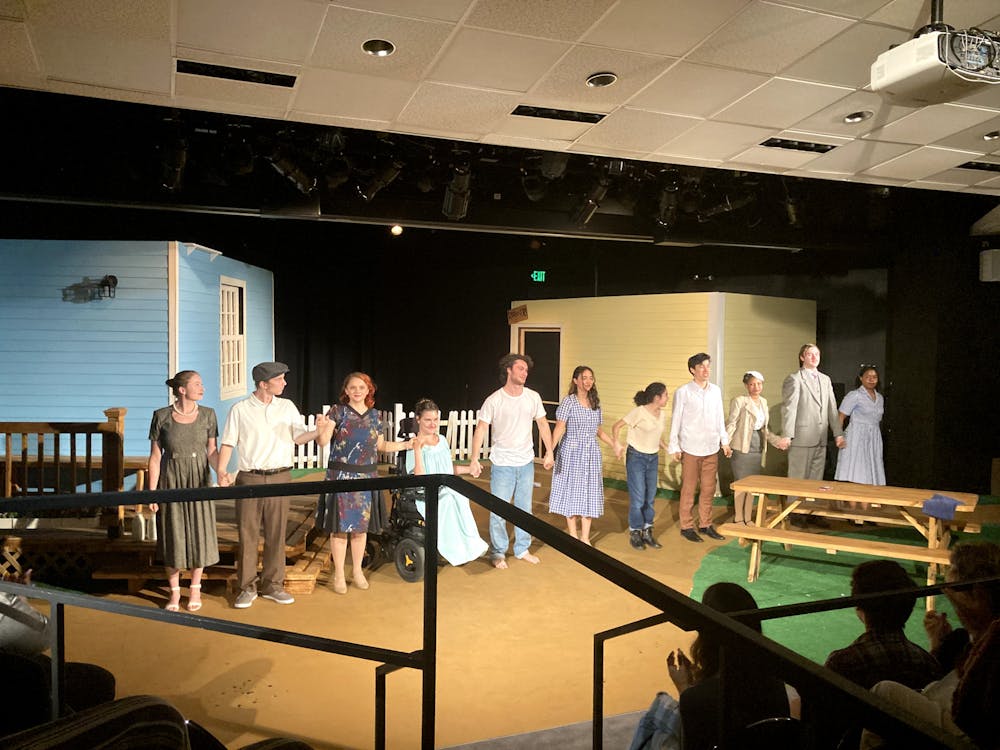Over the first weekend of November, the Barnstormers presented playwright William Inge’s Pulitzer-winning play Picnic at the Arellano Theatre. Written in 1953 and set in a small Kansas town, Picnic is a touching coming-of-age story about love and passion — both young and old.
The play follows the disruption caused in the neighborhood of Flo Owens (senior Bri Groch) and Helen Potts (senior Darcy Trinco) after a young man Hal Carter (graduate student Mikey Pacitti) comes to Mrs. Potts looking for work. Hal is an old friend of Alan Seymour (junior Daniel Wen), who is dating Mrs. Owens’ elder daughter Madge (freshman Lulu Hassanein), considered the most beautiful girl in town.
However, there is an instant connection between Madge and Hal when they first see each other, and the rest of the play develops this Chekhov’s gun into an emotional climax over its two-hour runtime. It is a story of heartbreak, guilt and passion among the young lovers and also about love and relationships among the older supporting characters, who mirror a more mature picture of the youth’s situation.
These supporting characters include Rosemary Sydney (sophomore Khaya Cliett-Bright) and Howard Bevans (graduate student Mark Gonzales), whose love teeters in secrecy until they make a decision about their future. There is also Madge’s younger sister Millie (sophomore Liesel Arauz Vallecillo), an intelligent young girl struggling to compete with her elder sister’s famous beauty.
Through these characters, the play paints the dilemmas of small-town America. Madge is conflicted between the sensible thing to do — marrying the conscientious Alan — and running off with Hal, the shirtless stranger she has known for a day and to whom she has an inexplicably passionate attraction. Meanwhile, Howard is hesitant to marry Rosemary, and Millie is torn between her books and her wish to be pretty.
In the end, for better or for worse, the characters make their decisions. Madge runs off with Hal, breaking Alan’s heart and possibly her mother’s, who lets her go and make her own mistakes. Howard and Rosemary marry and walk into a future that is complicated by their middle-age. There is no clear way to feel about their choices — Madge’s decision to leave is as objectively unsound as it is hopeful and romantic.
For me, Hassanein and Pacitti were the stars of the show for their portrayal of Madge and Hal respectively. Hassanein played Madge with such a trance-like quiver in her voice that her character’s inner torment felt heavy across the auditorium. She speaks obliviously, her soul hanging in limbo and her mind riddled with indecision. Pacitti, on the other hand, struck the perfect balance to present the complex dichotomy between the athletic charisma and the inner helplessness of his character. Hal’s struggles with addiction and his inability to reconcile his past glory as a football player with his present decrepitude make for an extremely interesting character, and Pacitti does justice to all its facets.
The set was simple and well-crafted, with the blue Owens house and the sundance yellow Potts house across the stage, with most of the action happening in the yard in between. The bright colors of the landscape efficiently reflected the setting of small-town America, with the cricket chirps in the background immediately transporting me there. Simple yet effective features like these made for a sophisticated production that I highly appreciated.
Taking on an iconic and well-established play like Picnic was definitely a challenge, but director Marshall B. Garrett and producers senior Courtney Carreira and sophomore Elena Echavarria put on a successful show that did justice to its source material. Despite the length of the show, with two intermissions in between, it held together and at no point did it feel like it was dragging. Such tight direction and acting made for an incredibly immersive performance.
Overall, the hard work of the cast and crew was evident in the show. The touching story and its enigmatic characters were a delight to follow, and I was truly invested in them. Throughout the show, I found myself strongly reacting to their actions, vigorously shaking my head in disapproval when Madge leaves her home in the end. The Barnstormers delivered a great production this semester, and I am very excited to see them continue practicing their craft in the future.





